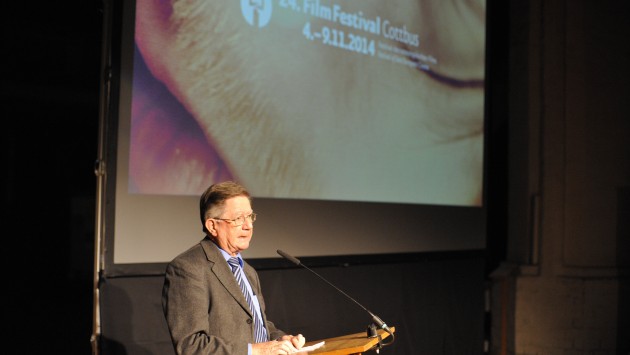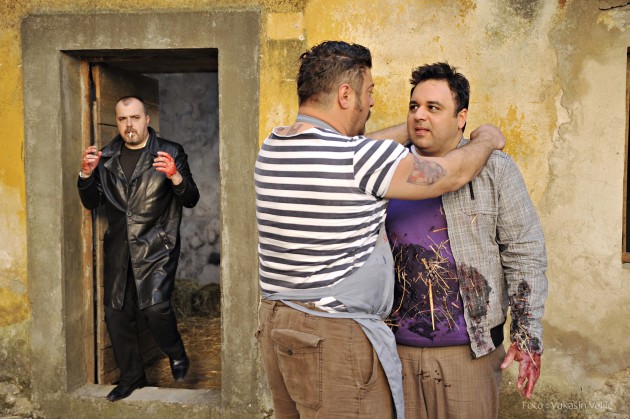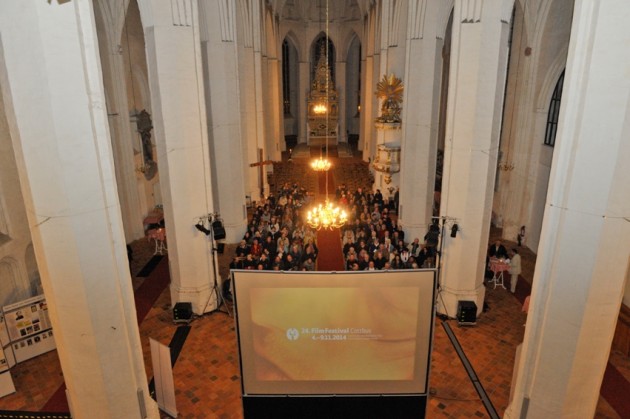"queerEAST" in the View of the Churches or: The Crux with the Human Rights

Hans Hodel in the church of St Nikolai during the Ecumenical Reception in Cottbus 2014
The press release for the festival, which announced this year's focus: "queer East" on the 10th of October, begins by addressing the current supranational power struggle between liberal modernisers and Europe-critical traditionalists as well as the Church's influence in many areas, particularly that of the orthodox churches not to mention the Catholic Church.
The churches of the East are in fact reluctant when it comes to accepting gay-lesbian persons and their lifestyle; the fact that the Protestant churches of the West have generally shown a greater degree of openness for some time (with the exception of evangelistic communities) has given rise to considerable tensions in the ecumenical dialog between the churches. After Sweden's parliament ruled to recognise gay and lesbian marriage under civil law in 2009, the Lutheran Church of Sweden followed suit with its support. "There are no sufficient theological arguments for rejecting the marriage of same-sex couples", declared Anders Weijrud, Primate of the Swedish Church and Archbishop of Uppsala (zeitzeichen 12/09). In the same year, 55-year old, openly lesbian pastor Eva Brunne joined the ranks of women elected Bishop of Stockholm whose ordainment in Uppsala Cathedral was attended by the royal couple.
It came as no surprise that the Russian Orthodox Church responded by distancing itself from the Sweden Lutheran Church. It also came as no surprise when I read in the Neue Zürcher Zeitung published on 13 September of this year that official talks planned between the Evangelical Lutheran Church of Finland and the Orthodox Church of Russia on questions relating to Christian anthropology had been called off. Archbishop Kari Mäkinen, in a statement to Finish media, explained that this was brought about by Finish Church's refusal to agree to the Russian prerequisite for the talks, that is, distancing itself from homosexuality.
In this context, we recall the indignation of the Russian Orthodox Church and differences associated with the election of Margot Käßmann as Chair of the Council of the Evangelical Church in Germany (ECG); differences that persisted following her resignation as Chair of the Council four years ago. Metropolit Ilarion (Alfejev), Head of the Department for External Church Relations of the Russian Orthodox Church, commented in an interview at the time that the election of Käßmann was only the tip of the iceberg. He stated further that the Russian Orthodox Church did not agree with the "liberalisation concerning the realm of theology, structure of the church and morality" occurring in numerous protestant communities as it is in the ECG (G2W No. 5/2010).
In fact, the spokesperson for the Russian Orthodox Church already threatened to withdraw from the World Council of Churches in Geneva in a report published by the Internet paper newsru.com. He allegedly stated that it is "clear that liberal protestant circles are attempting to make the World Council of the Churches into a tribute for the promotion of feminism, the rights of sexual minorities, ideas that undermine the sovereignty of states as well as a number of other political agendas" (zeitzeichen 1/2008).
The comment was among a long series of critical statements from the Russian Orthodox Church, which culminated in a momentous document relating to the 1948 Declaration of Human Rights published sixty years prior on 10 December 1948. The document published in July of that year bears the (precisely formulated) title "The Russian Orthodox Church's basic teaching on human dignity freedom and rights" and criticises the "Western" conception of human rights. It claims that many of which contradict Christian morality and therefore cannot be accepted by Christians without objection (cf. G2W No. 10/2009). Prior to its publication, Metropolit Kirill of Smolensk, the Head of the Department for External Relations of the Moscow Patriarchate though he emphasised the importance of human rights at a UN colloquium in Geneva ("… they are indeed an important institution in modern social order"), at the same time, also drew attention to the significance of ethical-moral standards and warned that the misunderstood definition of freedom poses a risk of undermining them (cf. ENI Bulletin dated 26 March 2008). The limited time for my talk does not allow me to address these statements in detail.
However, I will now briefly explore the position paper entitled "Human Rights and Morality” published by the Community of Protestant Churches in Europe (CPCE) following a prolonged consultation process in June 2009 as a response to the aforementioned document from the ROC. It openly admits that a number of Protestants such as Dietrich Bonhoeffer have taken action to support human rights contrary to the original mainstream dismissal of the Church and also openly states that human rights were initially considered to be a threat to the churches and in some respects, are still viewed as such. "Some believed that they threatened natural law while others questioned how relationships between the gospel and the law was defined; the churches therefore struggled to recognise the equalising principle of autonomy", writes Swiss theologian Frank Mathwig (G2W no. 10/2009). However, the churches "of the West" had a head start with respect to the establishment of contemporary thought although all churches must address it in the face of undeniable systematic violations of human rights, particularly those that took place in the 20th century. Nonetheless, there are points of dispute between the CPCE and ROC. On one hand, this concerns clarification of the terms "Human Dignity" and "Freedom" and determining the relationship between the Church and the State on the other. Differentiating between law and morality is of fundamental significance when it comes to a contemporary understanding of the state and society: Different views of life, goals and perspectives are up to the individual as long as they do not restrict the individual freedoms of third parties. In cases of conflict, the law comes into play by setting limits; however, laws do not describe how people are to express their freedoms, but merely define the limits of such freedoms.

As you can see, it is not possible at this point to address the problems that arising in this context, but you also understand why I have entitled my vote "The Issue of Human Rights". This also gives rise to occasional discussions in our ecumenical juries, which work in accordance with the guidelines of SIGNIS and INTERFILM that call for solidarity with all minorities as well as respect for human dignity and human rights. However, while the Russian state is passing repressive laws in this respect, orthodox priests in Russia and Georgia are publicly contributing to sentiment against Gay Pride and, in Serbia, are even protesting against the holding of Gay Pride, defaming homosexuality as a disease and threat to the family, the Ecumenical Jury awarded Commendation to the film "Parada" (The Parade) by Serbian director Srdjan Dragojevic in the Berlinale's Panorama in 2012. Ten years prior, then president of the Federation of Swiss Protestant Churches, reformed pastor Thomas Wipf, gave a brief speech at Christopher Street Day (CSD) held in Zurich under the motto "We are Family". In it, he emphasised the importance of legal recognition of same-sex partnerships, which was supported by a decisive majority vote of the Swiss people in a federal referendum. The differences defining ecumenical dialogue could hardly be any greater, let alone the current discussion within the Roman Catholic Church.
(Translation: Stacy Macaulay)


